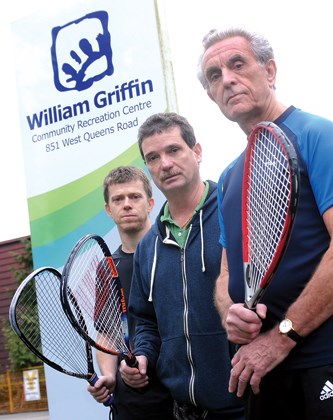The loss of racquetball courts in the future William Griffin recreation centre could be devastating to a core of dedicated North Shore athletes.
Ruben Ugarte and his fellow racquetballers are longtime players at the Delbrook centre, but with that facility combining with the proposed William Griffin centre, the options to play their favourite sport are quickly vanishing.
Back in 2012, the design plans for William Griffin included two squash courts and two courts that could be converted to play various racquet sports, including racquetball.
However, Ugarte and a few other players received a letter in January from the North Vancouver Recreation Commission, stating that the once-planned convertible racquetball courts would be completely eliminated and replaced with squash courts and a room for stretching.
Ugarte is representing a group of roughly 20 regular racquetball players, with some of the racqueteers having played the game together for more than 20 years. For them it goes beyond simple friendly competition.
“We have each other over for Christmas,” said Ugarte. “It’s more than just a game, there is very much a social part to this.”
Without the courts, Ugarte fears the group would split up and lose the sense of camaraderie that marked the group’s game.
David Aroeste, another member of the group, said that the recreation centre’s reversal will snuff out racquetball on the North Shore, as the only other recreation centre to offer the sport is Ron Andrews, whose sole court is currently being used for storage, according to both Aroeste and Ugarte.
“Not only (is the Griffin recreational centre) trying to kill the sport in North Shore, but they are also killing our group, because it’s a very social group and we support each other,” added Aroeste.
Aroeste has lived in North Vancouver for 24 years. As a new immigrant from Mexico City he said he faced the pressures of fitting into a new culture and job pressures.
For Aroeste, meeting a group of like-minded individuals and the athletic challenges of the sport allowed him to lift himself out of depression.
“I also had a heart issue abut five years ago, which I recovered from, but racquetball remains the only sport I can play. I can ski maybe for a run or two but then I start to feel pain, but I can easily go for three hours playing racquetball and feel great, because my body is so used to it after playing for years,” added Aroeste.
Referring to the mid-January letter addressed to certain members of the group, Aroeste said he was “pissed, because they sent it just a few days before the open house about the courts was scheduled.
“We didn’t have time to prepare our case properly and it was obvious it was set up like that on purpose.”
This is not the first time that the group has faced challenges.
In 2006, the group were told by Delbrook Centre that the squash and racquetball courts would be closed.
Aroeste said more than 560 signatures from squash, racquetball and other racquet sports helped save the courts from the chopping block.
Cathy Matheson, North Vancouver Recreation Commission’s manager of administration and marketing, said that while 2012 plans included the convertible courts, it had since been determined that not enough people were using the courts in Delbrook to justify spending money on new courts.
However, Matheson stated that the recreation commission was hoping to receive new information from architects about whether the courts could be included in the current design.
Aroeste and the other players are skeptical of the rec commission’s cost argument, with Aroeste stating: “A conservative ‘cost scenario’ approximates $75,000 for the full three courts installed. This cost equates to 0.15 percent of the $49 million facility cost,” said Aroeste. Aroeste went on to say that with other athletes, such as table tennis and wallyball players, the rec commission would recoup its cost on the courts within two and a half years.
The architect’s revised design plans are expected to be ready by the end of March.



